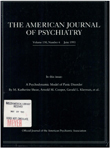Cognitive outcome following tricyclic and electroconvulsive treatment of major depression in the elderly
Abstract
OBJECTIVE: This study sought to ascertain the affective and cognitive outcome after tricyclic and electroconvulsive treatment of elderly medical-psychiatric patients meeting diagnostic criteria for major depression, some of whom had normal cognitive functioning and some of whom were cognitively impaired before treatment. METHOD: Patients who met criteria for major depression on the basis of a structured diagnostic interview and who scored 17 or more on the Hamilton Rating Scale for Depression were evaluated with the Mattis Dementia Rating Scale. The patients were then treated in a nonrandom manner with either tricyclic antidepressants or ECT (followed by tricyclic maintenance therapy). The majority of the patients treated with ECT had not responded previously to tricyclics. Follow-up psychometric testing was repeated in 6 months. RESULTS: Among the patients with normal pretreatment cognitive functioning, cognition was generally stable. Among the patients with pretreatment cognitive impairment, a substantial number--including those receiving ECT--demonstrated improvement in cognition. While the majority of patients improved with respect to both their affective and cognitive states, certain treatment- refractory subgroups were nevertheless identified. CONCLUSIONS: The data suggest that cognitive dysfunction associated with depression may improve after treatment in a substantial number of elderly patients, including those receiving ECT. Relapse rates, however, may be relatively high, and residual symptoms may persist, which emphasizes the need for optimal initial and long-term antidepressant strategies for this population.
Access content
To read the fulltext, please use one of the options below to sign in or purchase access.- Personal login
- Institutional Login
- Sign in via OpenAthens
- Register for access
-
Please login/register if you wish to pair your device and check access availability.
Not a subscriber?
PsychiatryOnline subscription options offer access to the DSM-5 library, books, journals, CME, and patient resources. This all-in-one virtual library provides psychiatrists and mental health professionals with key resources for diagnosis, treatment, research, and professional development.
Need more help? PsychiatryOnline Customer Service may be reached by emailing [email protected] or by calling 800-368-5777 (in the U.S.) or 703-907-7322 (outside the U.S.).



